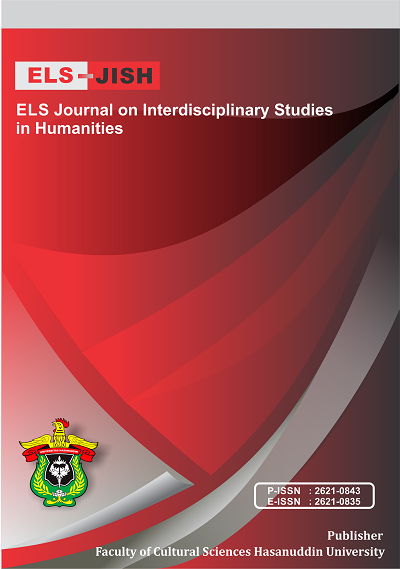Analysis of Vaccine Hoax Information in Facing the Covid-19 Crisis on Twitter
DOI:
https://doi.org/10.34050/elsjish.v6i2.26799Keywords:
Content Analysis, Covid-19 Vaccine, Hoax; New Media, TwitterAbstract
Present the new media (internet) as a new challenged in the world of information, especially on hoax information. The increase in hoax messages has also been a challenge in managing the Covid-19 crisis, with social media becoming the new venue for the spread of hoax messages. The objective of the research was to analyze information on the Covid-19 vaccine on Twitter to be more careful in choosing and to reveal the disseminating information. This research used qualitative content analysis methods according to Philip Mayring and utilized the search engine on Twitter to collect data within a certain time span. The result of this research, found some hoax information on Twitter such as: Sinovac vaccine was haram, vaccine was killed, vaccine was spayed, and vaccines changed human DNA.
References
Assiroj, P., Hidayanto, A. N., Prabowo, H., & Warnars, H. L. H. S. (2018, September). Hoax news detection on social media: A survey. In 2018 Indonesian Association for Pattern Recognition International Conference (INAPR) (pp. 186-191). IEEE.
Alzedan. (2019). Sistem Informasi. Retrieved from https://doi.org/10.31219/osf.io/tdh8v.
Baran. (2012). Pengantar Komunikasi Massa, Melek Media & Budaya Jilid 2 (5th ed.). Jakarta: Erlangga.
Belinda, F., & Puspitasari, M. (2021). Hoaks and resistance to government motion case study KAMI (Koalisi Aksi Menyelamatkan Indonesia). Journal of Social Science, 2(2), 139-143.
Brüggemann, M., Elgesem, D., Bienzeisler, N., Gertz, H. D., & Walter, S. (2020). Mutual group polarization in the blogosphere: Tracking the hoax discourse on climate change. International Journal of Communication, 14(24), 1025–1048.
Emsir. (2016). Metodologi Penelitian Kualitatif: Analisis Data. Jakarta: Rajawali Pers.
Francisca . (2020). bisnis.tempo.co. Retrieved from https://bisnis.tempo.co/read/1318951/kominfo-ada-196-hoaks- virus-corona-terbanyak-di-fb-dan-twitter/full&view=ok
Gentina, E., Chen, R., & Yang, Z. (2021). Development of theory of mind on online social networks: Evidence from Facebook, Twitter, Instagram, and Snapchat. Journal of Business Research, 124, 652-666.
Kholit, N. J., & Nastain, M. (2021). Mapping of data communication networks on social media. INJECT (Interdisciplinary Journal of Communication), 5(2), 143-62.
Krippendorff, K. (2018). Content analysis: An introduction to its methodology. Sage publications.
Lind, P. G., Da Silva, L. R., Andrade Jr, J. S., & Herrmann, H. J. (2007). Spreading gossip in social networks. Physical Review E, 76(3), 036117.
McQuail. (2011). Teori Komunikasi Massa (6th ed.). Jakarta: Salemba Humanika.
Mu’ti. (2021). mediaindonesia.com. Retrieved from https://mediaindonesia.com/opini/376150/fikihvaksinasi-covid-1
Novaldi. (2017). kominfo.go.id. Retrieved from https://kominfo.go.id/content/detail/9725/pakar-it-tangkal-hoax-dengan-literasi-media/0/sorotan_media
Rachman, F. F., & Pramana, S. (2020). Analisis sentimen pro dan kontra masyarakat Indonesia tentang vaksin COVID-19 pada media sosial Twitter. Indonesian of Health Information Management Journal (INOHIM), 8(2), 100-109.
Rahman, F. (2019, February). Save the world versus man-made disaster: A cultural perspective. In IOP Conference Series: Earth and Environmental Science (Vol. 235, No. 1, p. 012071). IOP Publishing.
Rahman, F., Abbas, A., Hasyim, M., Rahman, F., Abbas, A., & Hasyim, M. (2019). Facebook Group as Media of Learning Writing in ESP Context: A Case Study at Hasanuddin University. Asian EFL Journal Research Articles, 26(6.1), 153-167.
Reilly. (2018). For Fake: Propaganda! Hoaxing! Hacking! Partisanship! and Activism! in The Fake News Ecology. The Journal of American Culture, 41(2), 139-152.
Sawitri. (2017). nasional.tempo.co. Retrieved from https://nasional.tempo.co/read/838621/4-penyebab-hoax-mudah-viral-di-media-sosia.
Sellnow, T. L., Parrish, A., & Semenas, L. (2019). From hoax as crisis to crisis as hoax: Fake news and information disorder as disruptions to the discourse of renewal. Journal of international crisis and risk communication research, 2(1), 121-142.
Maulana & Situngkir. (2010). Some Inquiries to Spontaneous Opinions: A case with Twitter in Indonesia. BFI Working Paper Series.
Shane-Simpson, C., Manago, A., Gaggi, N., & Gillespie-Lynch, K. (2018). Why do college students prefer Facebook, Twitter, or Instagram? Site affordances, tensions between privacy and self-expression, and implications for social capital. Computers in human behavior, 86, 276-288.
Sulistyanto, A., Nurhaliza, W. O. S., Salbilah, S., & Aurellie, F. S. (2022). Fear and anxiety in spreading covid-19 vaccine hoaxes as terror communication. Budapest Int. Res. Critics Institute-Journal, 15, 7077-7091.
Susilo, M. E., Afifi, S., & Yustitia, S. (2020). Hoax as a reflection on the low digital literacy in Indonesia. In Proceedings of the Second International Conference on Social, Economy, Education, and Humanity (ICoSEEH 2019)-Sustainable Development in Developing Country for Facing Industrial Revolution (Vol. 4, pp. 165-174).
Syatar, A., Mundzir, C., & Amiruddin, M. M. (2022, April). Religious Moderation Values in The COVID-19 Vaccine Phenomenon in Indonesia. In 9th Asbam International Conference (Archeology, History, & Culture In The Nature of Malay)(ASBAM 2021) (pp. 619-622). Atlantis Press.
Tchakounté, F., Calvin, K. A., Ari, A. A. A., & Mbogne, D. J. F. (2022). A smart contract logic to reduce hoax propagation across social media. Journal of King Saud University-Computer and Information Sciences, 34(6), 3070-3078.
We Are Social & Hootsuite. (2020). Indonesia Digital Report 2020. Global Digital Insight, Available on June 2020. https://datareportal.com/reports/digital-2020-indonesia
Yoedtadi, M. G., & Adina, A. (2021, August). Role of Public Relations to Prevent Hoaxes. In International Conference on Economics, Business, Social, and Humanities (ICEBSH 2021) (pp. 679-684). Atlantis Press.
Downloads
Published
How to Cite
Issue
Section
License
Copyright (c) 2023 Muhammad Syaiful, Muh. Akbar, Tuti Bahfiarti

This work is licensed under a Creative Commons Attribution-ShareAlike 4.0 International License.






